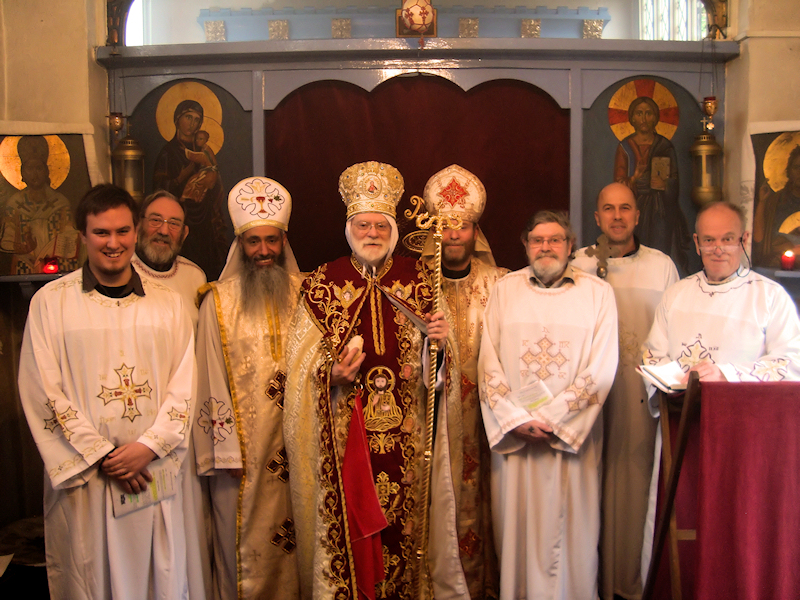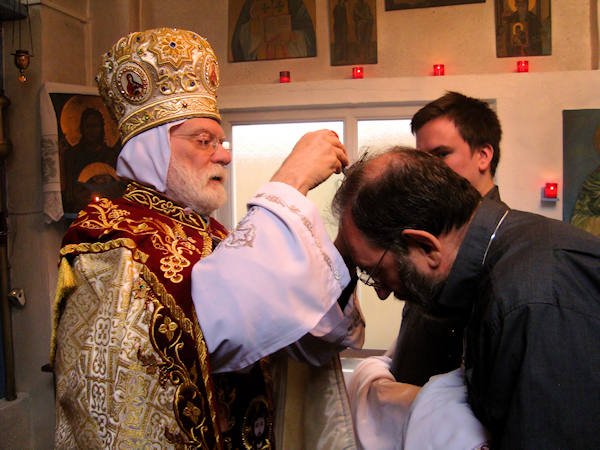Abba Seraphim attends Armenian Patronal Festival
The Armenian Church of St. Sarkis in Kensington, London, celebrated the eve of its patronal festival on 19 February with an Ecumenical Service for Peace. Officiating was the Right Rev’d Dr. Vahan Hovhanessian, Primate of the Armenian Church of Great Britain , assisted by Fr. Snork Bagdassarian. The Mayor and Mayoress of the Royal Borough of Kensington & Chelsea were present, as were a number of ecumenical visitors, including H.E. Archbishop Gregorios of Thyateira (Oecumenical Patriarchate), Abba Seraphim (British Orthodox Church within the Coptic Orthodox Patriarchate & the Council of Oriental Orthodox Churches), Archpriest Vadim Zakrevsky (representing Archbishop Elisey of Sourozh, Moscow Patriarchate). A canon of the diocese of St. David’s (Church in Wales) read the Old Testament lection and Abba Seraphim read the epistle, before Fr. Snork intoned the Gospel. Fr. Vahan spoke briefly about St. Sarkis and his significance today. Towards the end of the service Dr. Hratch Tchilingirian, Hon. President of the St. Sarkis Church Trust made a presentation and spoke in honour of Mr. John Kurkjian and Deacon Stepan Ovanessoff, two long-serving former trustees, who had both recently retired after more than forty years of devoted service to the Trust, the Church and their associated Armenian charities.
Following the service a reception took place for the whole congregation in the Church hall.
H.H. Pope Shenouda issues statement on the Egyptian Revolution
His Holiness Pope Shenouda III met with a small committee from the members of the Holy Synod on Tuesday morning 15th February 2011, and they released the following statement:
The Coptic Church salutes the honest Egyptian youth, the Youth of 25th January, who led Egypt in a strong peaceful revolution, in which precious blood was shed, the blood of the martyrs of the nation who were honoured by Egypt’s leaders and army, and also honoured by all the people and ourselves. We offer our condolences to their families and relatives.
The Coptic Church pays tribute to the valiant Egyptian army, and also to the Supreme Council of the Armed Forces for what it has issued of official statements regarding the security of Egypt both internally and externally. We support its decision in dissolving the Peoples’ Assembly and the Shura (Consultative) Council, and its call for security to reign.
We all believe that Egypt must be a democratic and civil nation, choosing members of its parliament through free and fair elections, having representatives from all facets of the people.
We support all of Egypt in its fight against poverty, corruption and unemployment, resisting anarchy and destruction, and for the foundation of security and safety, the principles of social justice and national unity and the curtailing of corrupt and unlawful people.
The Coptic Church prays for the great Egypt, which has a glorious history and ancient civilisation. We hope that the Lord to keep Egypt safe and spread in it calmness, stability, security and prosperity.
Shenouda III
Pope of Alexandria and Patriarch of the See of St. Mark
& Head of the Holy Synod of the Coptic Orthodox Church
South Coast ordinations

Abba Seraphim visited the British Orthodox Church of Christ the Saviour on 13 February to ordain three new Readers for the Bournemouth and Portsmouth congregations. Despite the heavy and almost incessant rain throughout the day, the morning Liturgy was well attended and those present were delighted to witness Daniel Malyon, Anthony-Paul Holland and Roger-John Morgan receive the clerical tonsure and to be ordained as readers. Assisting Abba Seraphim were Fathers Simon Smyth and Seraphim Mina as well as Nicolae Popa and James-Antony Kelly, two long standing Readers.
Whilst presenting them to Abba Seraphim for ordination Father Simon read letters of support including one from Mina Riwes of Washington DC, who had attended British Orthodox services at Bournemouth and Portsmouth whilst he was working in Britain last year and another from Father Marcos A. Marcos of St. Mark’s Coptic Orthodox Church, Scarborough, Toronto, who had received Roger-John into the Orthodox Church in Canada, who wrote, “Indeed they are worthy to join in the sacramental celebrations of our holy Church. On Sunday I will announce this news to our congregation and we will be sharing your joys singing ‘Axios,Axios,Axios’ ”. Another message came from Negati & Safaa Banayoty, through whom Roger-John had come to know the British Orthodox Church in Bournemouth and who were later to be his godparents. Daniel and Anthony Paul will largely serve at Portsmouth and Roger-John at Bournemouth, but as the two congregations are both under Father Simon’s pastoral care, they will often support both churches.
In his address Abba Seraphim spoke of the importance of the minor orders and their place in the ministry of the church and highlighted St. Paul’s injunction that “it is required in stewards that a man be found faithful”(1 Corinthians IV: 1-2) as well as the Lord’s promise to those who are faithful over a few things, “I will make thee ruler over many things” (Matthew XXV: 21).
A happy time of fellowship followed after the service and a buffet lunch was shared by those present.

Visit of Georgian Catholicos to London
His Holiness and Beatitude Catholicos Patriarch Ilia II of Georgia visited London to consecrate a new Cathedral for the 30,000 strong community of Georgian Orthodox living in the United Kingdom. Having established a Diocese of Great Britain and Ireland with Bishop Zenon of Dmanisi as its first hierarch, the Catholicos – assisted by several bishops of the Georgian Orthodox Church and His Eminence Archbishop Gregorios of Thyateira – consecrated the Cathedral of the Nativity of our Lord at Rookwood Road, Clapton, London, N16 on Sunday, 6 February. The newly designated Cathedral was formerly known as The Ark of the Covenant and was built in 1892-5 to a design by Joseph Morris & Sons of Reading for the long extinct millenarian sect, the Apapemonites. Neglected after the war it was rented out to other church groups and at one time in the 1960s the British Orthodox Church used it on a monthly basis.

The same evening the Georgian Orthodox community held a reception at the Dorchester Hotel in London for the Catholicos, to which a number of ecumenical guests were invited. The Oriental Orthodox Churches were represented by Archbishop Athanasius of the Syriac Church, Abba Seraphim of thev British Orthodox Church within the Coptic Orthodox Patriarchate and Father Snork Bagdassarion of the Armenian Apostolic Church. Representing the hierarchs of the Eastern Orthodox Churches were Archbishop Gregorios and Metropolitan Kallistos whilst the Right Rev’d. Geoffrey Rowell represented the Archbishop of Canterbury. In his short address Catholicos Ilia spoke movingly of the hospitality of the British people and expressed his respect and admiration for H.M. Queen Elizabeth II. He also touched on the difficulties of living next to a powerful nation and the pain of having Georgia’s territorial integrity compromised.
Abba Seraphim presented Bishop Zenon, who had been raised to archiepiscopal rank that morning, with a copy of a rare booklet from the library of the British Orthodox Church, which marked the opening of the Ark of the Covenant in 1894 and described the symbolism of the building. Abba Seraphim spoke of the beauty of the church and its personal significance to him as he had himself been ordained there as a reader in 1965 and a subdeacon and deacon in 1967. He expressed his delight to know that this fine building was now consecrated as an Orthodox cathedral.
Father Michael Robson suffers a fall
Father Michael Robson suffered a fall on 3 February during which he fractured the pubic bone in his pelvis and was admitted to hospital for treatment before returning to Morden College. He has since developed a chest infection which is causing some concern and on Friday evening, 4 February Abba Seraphim, attended by the chaplain of Morden College, Father Nick Woodcock, visited him and administered Holy Unction. Although in some pain and sedated, Father Michael was alert and able to follow and join in the prayers.
Only on Tuesday morning, 1 February, Abba Seraphim, assisted by Father Peter Farrington and Subdeacon Dr. Michael Kennedy, celebrated the Divine Liturgy at the Chapel of Morden College. Father Michael was not well enough to attend but afterwards Holy Communion was taken to him in his room and he was able to enjoy a time of fellowship with some of those present.
Your prayers are asked for Father Michael, who is in his 78th year.
